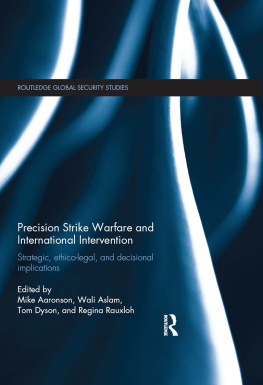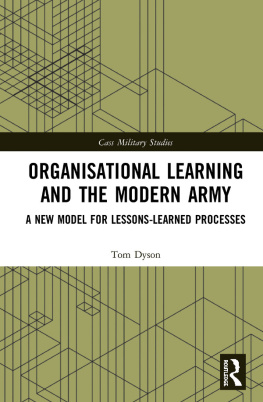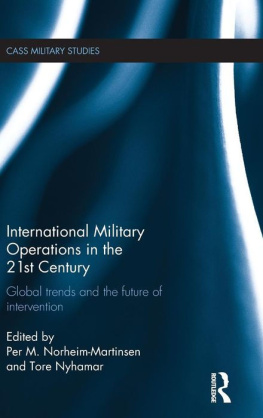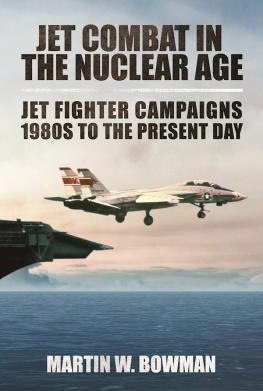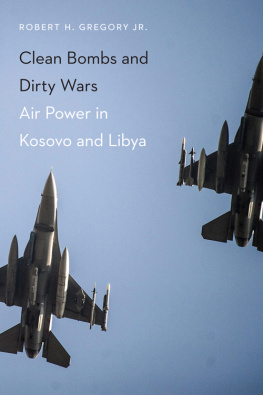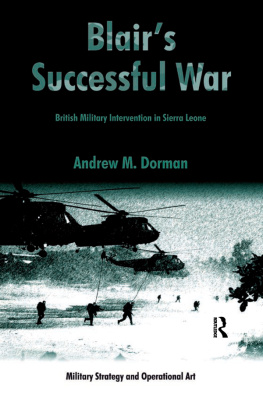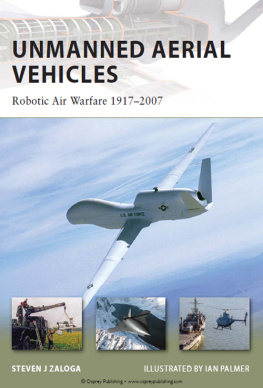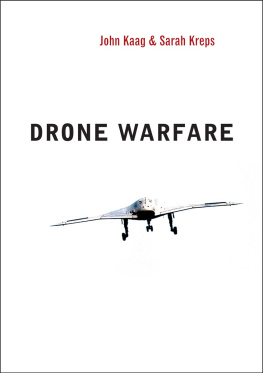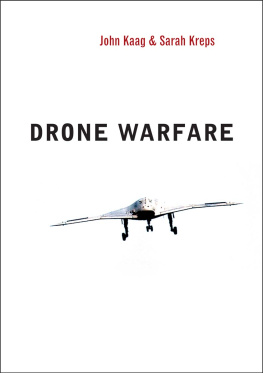Precision Strike Warfare and International Intervention
This book explores whether the new capabilities made possible by precision strike technologies are reshaping approaches to international intervention.
Since the end of the Cold War, US technological superiority has led to a more proactive and, some would argue, high-risk approach to international military intervention. New technologies, including the capacity to mount precision military strikes from high-level bombing campaigns and, more recently, the selective targeting of individuals from unmanned aerial vehicles (UAVs) have facilitated air campaigns, supported by Special Forces, without the commitment of large numbers of troops on the ground.
Such campaigns include, for example, NATOs high-level aerial bombardment of Miloevis forces in Kosovo in 1999 and of Gaddafis in Libya in 2011, and the US operation involving Special Forces against Osama Bin Laden. The development of UAVs and electronic data intercept technologies has further expanded the potential scope of interventions, for example against Islamic militants in the tribal areas of Pakistan.
This volume examines three key and interrelated dimensions of these new precision strike capabilities: (1) the strategic and foreign policy drivers and consequences; (2) the legal and moral implications of the new capabilities; and (3) the implications for decision making at the strategic, operational, and tactical levels.
This book will be of much interest to students of war and technology, air power, international intervention, security studies, and IR.
Mike Aaronson is the Executive Director of cii the Centre for International Intervention at the University of Surrey. He is a former chief executive of Save the Children UK and was previously a British diplomat.
Wali Aslam is Lecturer in International Relations at the University of Bath. He is the author of The United States and Great Power Responsibility in International Society: Drones, rendition and invasion (Routledge, 2013).
Tom Dyson is Senior Lecturer in International Relations at Royal Holloway College, University of London. He is the author of European Defence Cooperation in EU Law and IR Theory (2013, with Theodore Konstadinides).
Regina E. Rauxloh is Senior Lecturer at the Southampton School of Law, Southampton University. She is the author of Plea Bargaining in National and International Law (Routledge, 2012).
Routledge Global Security Studies
Series Editors: Aaron Karp and Regina Karp
Nuclear Proliferation and International Security
Edited by Morten Bremer Maerli and Sverre Lodgaard
Global Insurgency and the Future of Armed Conflict
Debating fourth-generation warfare
Terry Terriff, Aaron Karp and Regina Karp
Terrorism and Weapons of Mass Destruction
Responding to the challenge
Edited by Ian Bellany
Globalization and WMD Proliferation
Terrorism, transnational networks, and international security
Edited by James A. Russell and Jim J. Wirtz
Power Shifts, Strategy, and War
Declining states and international conflict
Dong Sun Lee
Energy Security and Global Politics
The militarization of resource management
Edited by Daniel Moran and James A. Russell
US Nuclear Weapons Policy after the Cold War
Russians, rogues and domestic division
Nick Ritchie
Security and Post-Conflict Reconstruction
Dealing with fighters in the aftermath of war
Edited Robert Muggah
Network Centric Warfare and Coalition Operations
The new military operating system
Paul T. Mitchell
American Foreign Policy and the Politics of Fear
Threat inflation since 9/11
Edited by A. Trevor Thrall and Jane K. Cramer
Risk, Global Governance and Security
The other war on terror
Yee-Kuang Heng and Kenneth McDonagh
Nuclear Weapons and Cooperative Security in the 21st Century
The new disorder
Stephen J. Cimbala
Political Economy and Grand Strategy
A neoclassical realist view
Mark R. Brawley
Iran and Nuclear Weapons
Protracted conflict and proliferation
Saira Khan
US Strategy in Africa
AFRICOM, terrorism and security challenges
Edited by David J. Francis
Great Powers and Strategic Stability in the 21st Century
Competing visions of world order
Edited by Graeme P. Herd
The Globalisation of NATO
Intervention, security and identity
Veronica M. Kitchen
International Conflict in the Asia-Pacific
Patterns, consequences and management
Jacob Bercovitch and Mikio Oishi
Nuclear Proliferation and International Order
Challenges to the Non-Proliferation Treaty
Edited by Olav Njlstad
Nuclear Disarmament and Non-Proliferation
Towards a nuclear-weapon-free world?
Sverre Lodgaard
Nuclear Energy and Global Governance
Ensuring safety, security and non-proliferation
Trevor Findlay
Unipolarity and World Politics
A theory and its implications
Birthe Hansen
Disarmament Diplomacy and Human Security
Regimes, norms and moral progress in international relations
Denise Garcia
Causes and Consequences of Nuclear Proliferation
Edited by Robert Rauchhaus, Matthew Kroenig and Erik Gartzke
Why Did the United States Invade Iraq?
Edited by Jane K. Cramer and A. Trevor Thrall
Regional Powers and Security Orders
A theoretical framework
Edited by Robert Stewart-Ingersoll and Derrick Frazier
A Perpetual Menace
Nuclear weapons and international order
William Walker
Irans Nuclear Programme
Strategic implications
Joachim Krause
Arms Control and Missile Proliferation in the Middle East
Edited by Bernd Kubbig
The National Politics of Nuclear Power
Economics, security and governance
Benjamin Sovacool and Scott Valentine
Arms Controls in the 21st Century
Between coercion and cooperation
Edited by Oliver Meier and Christopher Daase
Reconceptualising Deterrence
Nudging toward rationality in Middle Eastern rivalries
Elli Lieberman
Psychology, Strategy and Conflict
Perceptions of insecurity in International Relations
Edited by James W. Davis
Nuclear Terrorism and Global Security
The challenge of phasing out highly enriched uranium
Edited by Alan J. Kuperman
Ballistic Missile Defence and US National Security Policy
Normalisation and acceptance after the Cold War
Andrew Futter
Technology Transfers and Non-Proliferation
Between control and cooperation
Edited by Oliver Meier
Northern Security and Global Politics
Nordic-Baltic strategic influence in a post-unipolar world
Edited by Ann-Sofie Dahl and Pauli Jrvenp
Geopolitics and Security in the Arctic
Regional developments in a global world
Edited by Rolf Tamnes and Kristine Offerdal
Precision Strike Warfare and International Intervention
Strategic, ethico-legal, and decisional implications
Edited by Mike Aaronson, Wali Aslam, Tom Dyson, and Regina Rauxloh
Economic Statecraft and Foreign Policy
Sanctions, incentives and target state calculations

